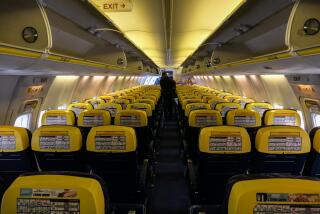Upward Mobility
- Share via
Nick Hambrick and Leonard Graves, both in wheelchairs because of accidents suffered as teens, met and became friends through an advocacy agency for the disabled. In 1993, they began selling “flat-free” wheelchair tires. Their company now distributes more than 1,000 wheelchair parts. Last year they graduated from a 15-month training course on exporting, and they now have clients in seven foreign countries. Hambrick was interviewed by freelance writer Karen E. Klein.
*
When you’re driving a car and you get a flat tire, you call a tow truck. But if you have a flat tire in a wheelchair, you can be in a very dangerous and traumatic situation, especially if you have no one to help you and you’re far from home.
We heard about this foam-filled wheelchair tire that does not go flat, because of the way it is designed, and we knew it would be a very important product for the disabled. So we made an agreement with another company to co-manufacture this item and distribute it.
I knew that this product could find a market overseas, but neither of us had any experience with exporting. Then I met a representative from the Small Business Administration who encouraged me to apply for the Export Trade Assistance Partnership (E-TAP) program run out of the Long Beach U.S. Export Assistance Center.
My partner and I took turns attending the monthly sessions, where they had guest speakers talk about the various facets of exporting. Even when a topic really looked boring, once I saw how it related to my business it became very interesting.
The class was small enough to allow us to ask questions specifically for our business. Along with the classes, they provide ongoing assistance.
In 1996, we attended the largest medical trade show in the world and set up a booth aimed at attracting foreign clients. We talked to a lot of people and passed out the brochures, but not a lot happened.
Then in 1997 we did the same thing, and this time we cultivated some real contacts. I think the overseas buyers who saw we were there again began to have some confidence in us.
So far, we’ve done business with small companies in Brazil, Israel, Australia, Taiwan, Canada, Germany and Switzerland. We feel that if we work with enough small companies, eventually we’ll start getting orders with the bigger ones. If you bunt enough times, the infield comes in and you can hit a home run.
One thing we learned that’s really been valuable is the mind-set of the overseas customer. The way they do business, set terms and what shippers and carriers they prefer makes exporting a more customized process. There are also a lot more regulations and red tape, but E-TAP helped explain what those were. We do a lot of business online and accept international credit card payments that make the monetary exchange much simpler.
Our clients are glad to work with us because many of them cannot get these products in their own countries. Also, product expectations in the United States are so high that they know if they sell well here, they will generally be well-accepted in other countries.
In one year, we went from 0% to 5% of our business being exports. I’d like to see that grow eventually to about 20% or 25% of our business. Those numbers will never balance the trade deficit, but for us they’re not bad.
(BEGIN TEXT OF INFOBOX / INFOGRAPHIC)
At a Glance
* Company: New Solutions
* Owners: Nick Hambrick and Leonard Graves
* Nature of business: Distributor of wheelchair parts
* Location: 4321 Alamo St., Riverside
* Founded: 1993
* Employees: 5
* 1997 revenue: $1 million
More to Read
Inside the business of entertainment
The Wide Shot brings you news, analysis and insights on everything from streaming wars to production — and what it all means for the future.
You may occasionally receive promotional content from the Los Angeles Times.








